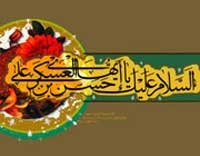
Imam Abu Muhammad al-Hasan al-Askari (a.s.) was from the heart of the prophetic family, by which Allah had honoured the Arabs and Muslims. It was the holiest family that had undertaken the issues of truth and justice among all peoples of the earth. There is no lineage in this world like the noble lineage which Imam al-Askari (a.s.) belonged to.
He was the son of Imam al-Hadi bin Imam Muhammad al-Jawad bin Imam Ali ar-Redha bin Imam Musa al-Kadhim bin Imam Ja'far as-Sadiq bin Imam Muhammad al-Baqir bin Imam Ali Zayn-al-Aabidin (as-Sajjad) bin Imam al-Husayn bin Imam Ali bin Abu Talib (peace be on them). These were the infallible imams of the Ahlul Bayt (a.s) whom Allah had kept uncleanness away from and purified a thorough purifying, and whom the Prophet (a.s) had made as the boat of rescue and safety for people.
His Father
His father was Imam Ali al-Hadi (a.s.), the tenth imam of the Shi’a faith. He was from the masters of the Ahlul Bayt (a.s) and the most knowledgeable, pious, and virtuous of all people at his time.
His Mother
His mother was the best of women at her time in her chastity, purity, and piety. Historians say she was from the good knowing women.[1] Imam al-Hadi (a.s.) praised her by saying, ‘Saleel (her name) was purified from error, defect, and impurity.’[2]
She was a bondmaid[3] from an-Nawbah.[4] It did not harm her that she was a bondmaid, for man in the view of Islam is exalted by his guidance, piety, and propriety, and he is degraded by deviation from the right path.
Historians disagreed on her name. Some of them said her name was Saleel, which is the most valid assertion according to the previous tradition of Imam al-Hadi (a.s.). Some said she was called Sawsan.[5] Others said her name was Hadithah,[6] and others said Hareebah.

The Great Newborn Child
The birth of the newborn boy, Hassan Al-Askari who was the descendant of prophethood, and the remainder of the Imamate, made the world shine and Samara bloom. This great newborn was the continuity of the life of his infallible fathers who lit the intellectual life in the world of Islam. Delight and joy filled the hearts of the prophetic family for they knew that he would be the imam after his father, as Imam al-Hadi (a.s.) had told them.
Some historians said he was born in Medina,[7] and some others said in Samarra.[8] Historians also gave different dates for his birth. It was said that he was born in Rabee’ al-Awwal[9] 230AH,[10] or 231,[11] or 232,[12] or 233.[13]
Ceremonies of Birth
After the birth of this blessed son, Imam al-Hadi (a.s.) recited the call to prayer in his right ear, and the Iqamah, the call to start prayer in his left ear. This was the first hymn that this blessed newborn boy met life with; “Allah is great, there is no god but Allah”.
On the seventh day after birth, Imam al-Hadi (a.s.) cut the hair of his newborn child, and gave silver or gold as much as the weight of his son’s hair to the poor as charity.
His Name And Surname
Imam al-Hadi (a.s.) named his blessed newborn child “al-Hasan” like the name of his great uncle, the master of the youth of Paradise. He surnamed him as Abu Muhammad,[14] and Muhammad was the name of the awaited Imam al-Mahdi (a.s.), the great reformer and saviour of humanity, and the sought-after hope of the deprived and the disabled in the earth.
His Epithets
His epithets expressed his high and noble qualities. He was called:
1. Al-Khalis (the pure)[15]
2. Al-Hadi (the guide)[16]
3. Al-Askari (of the military);[17] he was called so because the city (Samarra’) he lived in which was a military camp.
4. Az-Zakiy (pure, chaste, righteous)[18]
5. Al-Khass (peculiar),[19] that Allah had distinguished him with virtues, and with responding to his supplications
6. As-Samit (silent),[20]: he was silent and he spoke just wisdom, knowledge, and the mention of Allah
7. As-Sires (lamp),: that he was as a lamp lighting the way and guiding the deviant to righteousness
8. At-Taqiy (pious)[21]
References
[1] Uyun al-Mu’jizat.
[2] A’yan ash-Shi’a, vol.3 p.289.
[3] Usul al-Kafi.
[4] Sirr as-Silsilah ath-Thahabiyyah, p.39. An-Nawbah is a wide area in the south of Egypt. The Prophet (a.s) praised the people of an-Nawbah by saying, ‘Whoever has no brother, let him take a brother from an-Nawbah.’
[5] Bihar al-Anwar, vol.50 p.37.
[6] Al-Irshad, p.315.
[7] Akhbar ad-Duwal, p.117, Bahr al-Ansab, p.2, Tuhfat al-Imam, p.86, Ilal ash-Sharayi’.
[8] Jawahir al-Ahkam.
[9] The third month in the Islamic calendar.
[10] Bihar al-Anwar, vol.50 p.35, Tareekh Abul Fida’, vol.2 p.48, Ilal ash-Sharayi’.
[11] An-Nujoom az-Zahirah, vol.3 p.32, Sirr as-Silsilah al-Alawiyyah, p.39.
[12] Bahr al-Ansab, p.2, Akhbar ad-Duwal, p.117, al-Ittihaf Bihubil Ashraf, p.86, al-Kamil, vol.5 p.373.
[13] Encyclopedia of al-Bustani, vol.7 p.45.
[14] Akhbar ad-Duwal, p.117, Bahr al-Ansab, p.2, Tuhfat al-Anam, p.86, an-Nujoom az-Zahirah, vol.3 p.32.
[15] Akhbar ad-Duwal, p.117, Bahr al-Ansab, p.2.
[16] Bahr al-Ansab, p.2.
[17] Ibid.
[18] Tuhfat al-Anam, p.87, Bihar al-Anwar, vol.50 p.236.
[19] Tuhfat al-Anam, p.87.
[20] Ibid.
[21] Safinat al-Bihar, vol.1 p.259.













